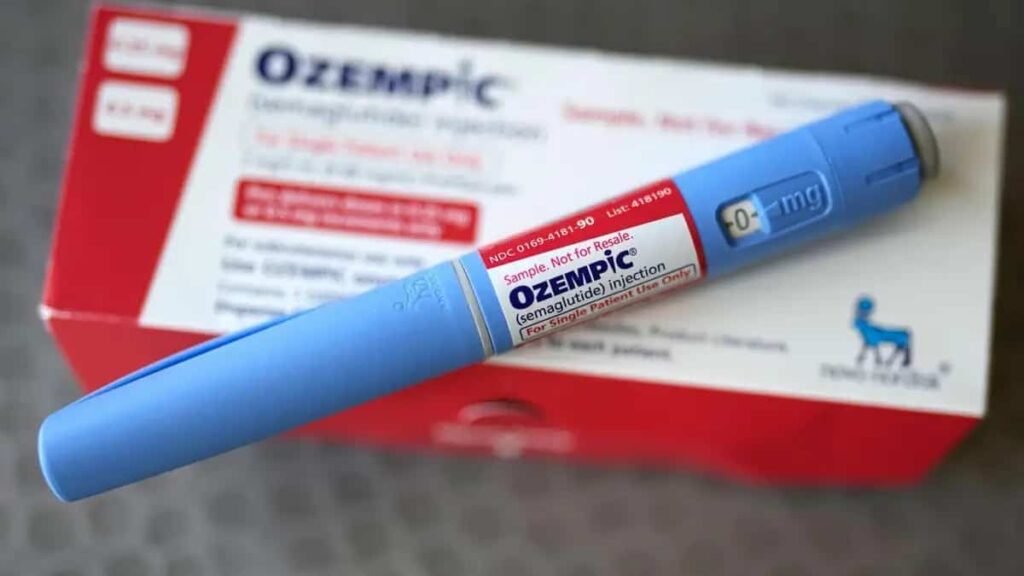[ad_1]
Oh, the whiplash Oprah recently caused when she admitted to her past belief that weight loss medications were ‘the easy way out,’ only to confess that she is now on one.
It’s a woman’s prerogative to change her mind, of course, although when you’re a public figure, well, you can’t help but do it in public.
I think we can all see that her flip-flop on the subject is a testament to the constant and pernicious thin body expectations of our society and the pervasive belief that if you’re just strong enough, you’ll be able to lose that weight on your own. Unless you’re weak, in which case you’ll need to resort to surgery or medication.
Oprah is actually part of the problem, and not because she’s on this medication.
She’s part of the problem because she’s a partner and board member of WW – aka Weight Watchers, and has been pushing their product for years, even when it has proven to be very problematic (remember Kurbo, the WW for kids?). Weight Watchers is one of the oldest commercial diet programs out there, and I don’t think I’m off base when I say that it has a terrible reputation for ruining a lot of peoples’ relationships with food. Even when they were very young.


I have clients come to me who still, after many years, think of food in ‘points’ rather than as actual food.
Still, Oprah has publicly and privately struggled with her weight her entire life. Why shouldn’t she take action in a way that works for her?
And even when people qualify for one, why is it that being on a weight loss medication is something they feel they need to hide, lie about, or justify?
Let’s dive in with a brief review of GLP-1 agonists to start.
What are GLP-1 agonists?
It’s important to know that we all make our own GLP-1, which stands for glucagon-like peptide. GLP-1 is a hormone produced in the gut which is released when we eat. The body’s response to GLP-1 is to increase insulin production, slow gastric emptying (so we feel full, and stop eating), and to inhibit glucagon secretion (therefore lowering our blood sugar).
GLP-1 is stimulated by all of the macronutrients – fats, carbohydrates, and protein. Fibre is also known to positively impact GLP-1 secretion.
GLP-1 agonists, medications that were originally developed to lower blood sugar in diabetics, are the closest thing we have to a ‘magic bullet’ for weight loss. Delivered by a once-weekly injection (only one pill option exists right now), the medication works just like the GLP-1 our bodies make, leading people to eat less and as a result, lose weight.
Is Ozempic a good option for weight loss? My thoughts here.
That hasn’t escaped the consciousness of pretty much everyone on the planet, and predictably, the past year has seen an explosion of people using these drugs for that purpose.


(AP Photo/David J. Phillip/Alamy)
For the people who can’t lose weight no matter what, whose weight is impacting their health and their quality of life, who have never experienced living without the constant food noise in their head, GLP-1s are not easy. They’re potentially life-saving, and to go on them isn’t a decision made without careful consideration.
As a dietitian who has seen a lot of these people suffering for decades of their lives, I fully support the use of GLP-1s and am happy that they’re available (I do wish that they were more accessible from a financial perspective, though).
Being on medication doesn’t heal your emotional relationship with food.
Celebrities and Ozempic
Technically, it’s nobody’s business what someone chooses to do with their body. That’s why the topic of celebrities on GLP-1 agonists is so fraught: do we talk about people in the public eye who have lots vast amounts of weight but don’t cop to being on these medications?
After all, someone’s private medical treatment is just that: private.
Do we speculate about which celebrities might be on them?
Nope. I’m not going to do that.
Instead, I want to talk about the ‘why’ behind lying about it and the consequences that may have, for them and others.
These nutrition and diet trends need to stay in 2023. Read here.
I’m a huge fan of being open about things that most people don’t want to talk about. It makes others in the same situation feel like they’re not alone, and I do believe that it’s helpful in erasing the stigma around difficult subjects.
So, why do people lie about being on weight loss medications?
Shame.


‘Celebrity Body’ is an actual column in a magazine. And we wonder why celebrities and even non-celebrities have body issues (and feel the need to lie about being on weight loss medications.)
Our society sucks at understanding the obesity is a chronic disease. That it’s not a matter of ‘eat less, exercise more’ for a huge number of people in the world. We’re great at glossing over and just plain ignoring the complexity that is weight.
We just prefer to believe that fat people are lazy, and now that we finally have a medication that can actually help a lot of these people lead normal lives, we shame them for taking it.
‘If you had self control, you wouldn’t need medication to lose weight.’
Or, ‘you’re taking the easy way out.’
What happens then is that our shame becomes that person’s inner voice.
‘I should be able to eat less, but I feel broken. I just can’t lose weight and it’s my fault.’
Or, ‘I’m a bad person because I take care of myself, but I’m still fat. I’m a failure because I need to resort to medication to do what I should be able to do for myself.’
Sometimes that shame may be, ‘I know I don’t need these medications and I certainly don’t qualify for them, and in taking them I am depleting the supply for people who actually need them to live, so I’m going to hide the fact that I’m that sort of a person.’
This piece is not about that last group. Taking GLP-1s for vanity weight is its own issue, mainly because it messes up the supply for people who actually need these medications to live. It also perpetuates the incredibly harmful ‘thin at any cost’ thinking that IS the diet industry and diet culture. It also sets unrealistic expectations about bodies, which isn’t helping anyone.
Because some of these people can’t get GLP-1s from ethical practitioners, they’re getting them from friends or from places like medi-spas that don’t know their medical history and aren’t going to follow up closely with them if there are side effects.
This recent investigative report in the Toronto Star details how the reporter was easily prescribed Ozempic by an online company, when she does not qualify for it.
None of this is okay. As a dietitian, I can’t support the use of GLP-1s to lose vanity weight, because I see huge ethical and safety issues with it.
But for the people who qualify for and are taking GLP-1s to lose weight, it seems like they just can’t win.
Shamed if they’re fat.
Shamed if they take medications to lose weight.
Constantly subjected to speculation that’s intrusive and embarrassing.
Why are we so surprised that these people don’t want to admit that they’re using these drugs?
There are some potential consequences to hiding GLP-1 use. Especially if someone is in the public eye, and especially if they’ve been asked outright and choose to not answer.
If someone has used GLP-1s to lose a significant amount of weight, and says they did it with diet and supplements, this can cause people to try and follow their ‘example,’ potentially leading them into a harmful way of eating. This is precisely what Amy Schumer meant when she called out celebrities who are lying about taking the drugs.
It perpetuates the stigma around these medications. Again, not talking about something because it’s perceived to be shameful, just continues to cloak it in shame. Shining a light on these medications – while also addressing the shame behind them – would go a long in neutralizing these attitudes.
I think we need better understand that no matter what someone does to lose weight, it isn’t the ‘easy way out.’
That in the vast number of cases, their lives have been the opposite of easy, precisely because of their weight. They’ve been discriminated against, they’ve been physically limited in what they can do, their physical and emotional health has suffered, and they’ve been judged by themselves and others. None of that is easy.
We need to begin seeing people hiding their use of GLP-1s for weight loss through a lens of compassion.
Although I’ve outlined the potential consequences of not revealing that they’re using these drugs, there’s likely a good reason why they haven’t come clean about it. Because they’re afraid of being judged, and rightfully so.
The best thing we can do is to stop talking about peoples’ bodies. Period. We shouldn’t be looking to other people for weight loss examples or advice, anyhow.
Whatever they do for themselves, in their own private life, is their business. If these individuals aren’t pushing weight loss drugs on others who don’t qualify for them, why do we care so much about what they weigh?
From now on, let’s have compassion and less judgement around weight, and more acceptance of the fact that everyone has their struggles.
Click here to get The Alkaline Diet at discounted price while it’s still available…
[ad_2]



7 Comments
Tham gia cộng đồng game thủ tại Go88 để trải nghiệm các trò chơi bài, poker phổ biến nhất hiện nay.
kuwin sở hữu kho game đa dạng từ slot đến trò chơi bài đổi thưởng, mang đến cho bạn những giây phút giải trí tuyệt vời.
iwin – nền tảng game bài đổi thưởng uy tín, nơi bạn có thể thử vận may và tận hưởng nhiều tựa game hấp
Đến với J88, bạn sẽ được trải nghiệm dịch vụ cá cược chuyên nghiệp cùng hàng ngàn sự kiện khuyến mãi độc quyền.
Với giao diện mượt mà và ưu đãi hấp dẫn, MM88 là lựa chọn lý tưởng cho các tín đồ giải trí trực tuyến.
https://askoff.ru
asklong.ru